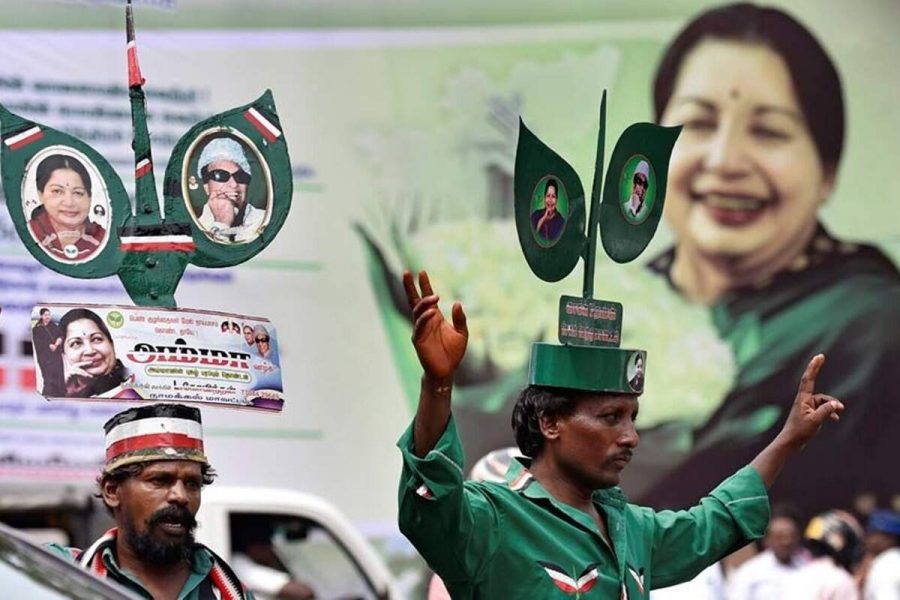
AIADMK@50: The political party MGR built battles for survival
Some of the key challenges facing the AIADMK are: lack of a strong leader, the party also quickly needs to do a course correction on its principles and policies, and take a hard look at the way it handles the Bharatiya Janata Party, which had tried to replace them as a counterforce to the DMK.

The MGR era
Many years ago, a reader sent a letter to a Tamil magazine editor asking for yesteryear superstar MG Ramachandran’s address. MGR’s first film as a lead actor, ‘Rajakumari’ (1947) was a major hit. By the mid-50s, as the actor was trying to create a niche for himself in the Tamil film industry, he met with an accident and fractured a leg. Some of his film projects were shelved and some of his films had also flopped at the box-office. Many thought the actor’s career was over.
“MGR has no address for himself now. What are you going to do with his address?” replied the magazine. Time passed. In 1961, ‘Thirudathey’, the Tamil remake of ‘Pocket Maar’, became a major hit and it was from this film, MGR’s image from being a swashbuckling hero changed and he became a champion of the poor imparting social messages rapidly achieving a demi-god status.
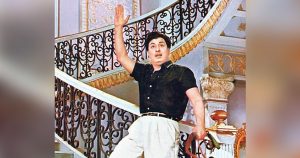
At this time, another reader sent a similar request to the same magazine. The magazine replied, “MGR has no time for acting. How can he meet you with his busy schedule?”
This incident was recorded by MGR himself in his autobiography ‘Naan Yen Piranthen?’. For many years, the actor and his family resided in a house named ‘Thaai Veedu’, 160, Lloyds Road (which is now called as Avvai Shanmugam Salai).
It was while living in this house, MGR became a superstar and a Dravida Munnetra Kazhagam (DMK) leader. In the 1967 state Assembly elections, while the DMK won the mandate, MGR won from the Parangimalai constituency against the Congress candidate TL Raghupathy. It was not just his charisma, it was also because of the sympathy he had earned after a murder attempt on the popular actor through a gun shot fired by the fellow actor MR Radha, just weeks before the elections.
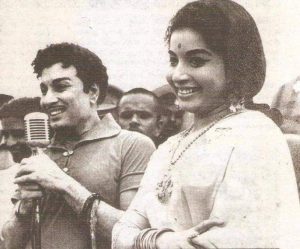
On October 10, 1972, MGR was expelled from the DMK for demanding to check the party accounts. Within two days i.e., on October 12, he launched Anna Dravida Munnetra Kazhagam (the words ‘All India’ was added much later). From 1973, the building at Avvai Shanmugam Salai which had housed ‘Nadigar Sangam’ (South Indian Artistes Association) for a few years became the headquarters of the AIADMK.
After his death in 1987, following the split in the AIADMK (the Janaki Ramachandran vs the J Jayalalithaa faction), the party office was shut down for a short period. Both fought for the ownership of the office. However, the property was purchased by MGR’s wife Janaki in 1950s, and it was under her name till she had gifted it away to the party in 1986.
Fifty years after the party’s launch, the current dispensation has renamed the AIADMK headquarters now as ‘Puratchi Thalaivar MGR Maaligai’. From a person who had started out with ‘no address for himself’ to the address of the party office being named after him, MGR’s and AIADMK’s journey had played a significant role in Tamil Nadu’s film industry and politics driving home that cinema and politics could never be separated in the state.
Also read: 5 key questions AIADMK must answer in its 50th year
50 years of the AIADMK
On its 50th golden jubilee anniversary, the party that MGR started, the AIADMK is staring at a bleak future. A political commentator, who wished to remain anonymous pointed out that in all these 50 years, the AIADMK failed to build a strong infrastructure and base in other parts of the state like its adversary, the DMK, has done. “The future of the party now will depend on the strength of its finances. That will play a key role,” he added.
Some of the key challenges facing the AIADMK are: lack of a strong leader, the party also quickly needs to do a course correction on its principles and policies, and take a hard look at the way it handles the Bharatiya Janata Party, which had tried to replace them as a counterforce to the DMK.
From Anna-ism to Anti-Karunanidhi
When the founder of the Dravidar Kazhagam (the parent organisation for DMK) Periyar EV Ramasamy launched his party organ ‘Viduthalai’ in 1937, a sub-editor had asked him about the topic of the editorial.
“Read the editorial of ‘The Hindu’. Take an opposing stand to that and it would be our editorial. Because whatever they (read Brahmins) write is good would be bad for us and vice-versa”, Periyar is said to have replied.
Similarly, MGR based his party’s principle and policy on one agenda: to be anti-DMK. To be more precise, he was ‘anti-Karunanidhi’. However, MGR, in public, said that he followed the policy of Anna-ism. The philosophy of DMK founder and former chief minister CN Annadurai became the founding principles of the AIADMK.
“What is the basis of Anna-ism? It is based on the love of cadres, on humanity. Anna tried to create a society based on equality and rationalism,” wrote MGR in one of his letters to the cadres published in ‘Thennagam’, a party organ.
“But has it followed Anna-ism in both letter and spirit? The answer is no,” said Dr Rajan Kurai Krishnan emphatically. He is an associate professor, School of Culture and Creative Expressions, Dr BR Ambedkar University, New Delhi. “Annadurai firmly believed in federalism and state autonomy. But MGR and his party have always been subservient to the Union government,” he pointed out.
Also read: ‘Coming soon, to set party on right track’: Sasikala plots comeback
“MGR included spirituality and nationalism, which were neglected by the DMK in its party principles. With this thinking, he attracted dominant intermediary castes like Mukkulathor into his party. He always made compromises with the Union government; he supported the Emergency. If you look at the complete picture, the AIADMK is a distorted mirror image of the DMK,” said Krishnan to The Federal.
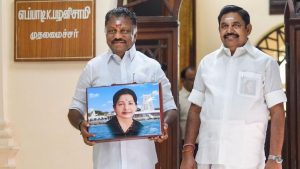
After Jayalalithaa, the AIADMK has allegedly become a mere ‘B Team’ of the present disposition at the Centre. This was abundantly clear when it came to issues such as NEET, New Education Policy, three language policy (giving the nod first and then withdrawing it after the protests), the CAA, farmers’ law, handling of the pandemic, etc. They were heavily criticised for their responses to these serious matters in the state.
Unless, the AIADMK do a course correction in its party principles and policies, the days ahead will be harder, observed P Ramajayam, a renowned psephologist.
“Take DMK for instance. Its policies are always based on Tamil centric issues. Be it state rights, language policy, Hindi imposition, etc., the party talks and fights for relevant contemporary issues. The AIADMK meanwhile mostly walk hand-in-hand with the Union government. They have no vision and hence they don’t know what they can offer new for the state in the future,” he added.
In search of a leader
“It is true that our party has no charismatic leaders like MGR and Jayalalithaa. But they were far removed from the cadres at the ground level. While the current leadership, O Panneerselvam or Edappadi K Palaniswami came from among us. They are affable and accessible,” said Vairamuthu, state deputy secretary (elections), AIADMK.
At one level, the claim of “affable and accessible” could be true because post-Jayalalithaa, the culture of prostrating at the feet of party leaders disappeared. Similarly, the party often boasts that it is more democratic than the DMK. It is proud of the fact that people like OPS and EPS who ran a tea stall and jaggery units, respectively, became leaders.
“But even they have come from dominant castes like Thevar and Gounder. At a time when the party needs a unitary leadership, these two leaders have further divided the party into west and south,” pointed out Ramajayam, who is also an assistant professor, Centre for Study of Social Exclusion and Inclusive Policy, Bharathidasan University, Trichy.
But is the AIADMK truly democratic? asks Krishnan. If the current leaders believed in democracy then they should have been open to criticism. But it appears there is no such thing, he said.
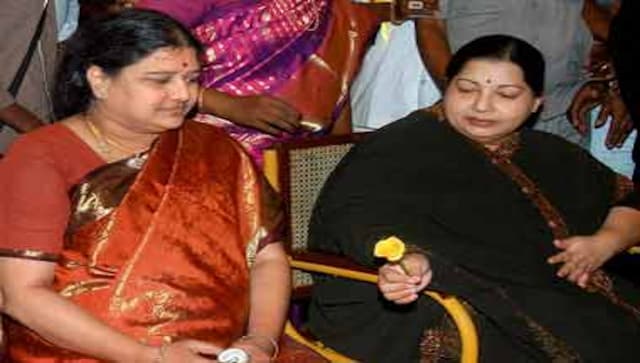
“If MGR is number one, others were zero. Same was with Jayalalithaa. The party runs mostly because of ‘popular sovereignty’. After Jayalalithaa’s death, as the normal course of events Sasikala should have been at the helm of the party. But the BJP didn’t want her to become a leader. When it realised that it cannot win the Sssembly elections with the help of OPS and EPS since they are not powerful enough to woo the people, people like Gurumurthy suggested that the AIADMK could take the help of Sasikala. However, they were not ready to seek Sasikala’s aid because of the fear that they could be avenged anytime,” wrote Krishnan in one of his recent articles published in ‘Minnambalam’, an online Tamil magazine.
The cadres are in a confused state because of the dual leadership. Mostly, they all agree on on one thing – they don’t want Sasikala to become a leader.
A party office-bearer, who preferred to remain anonymous, was against Sasikala taking over the reins of the party. According to him, OPS had joined AIADMK in 1973, while EPS joined in 1974. “They are in the party from MGR’s time. Sasikala was nowhere then. Or, for that matter, even Jayalalithaa was not there. They worked hard to attain their respective positions. But how can Sasikala, who assisted Jayalalithaa just as a servant become the leader? How can she campaign after being convicted for corruption? That will affect the morale of the cadres.”
Also read: No charming leader, but AIADMK needs a narrative at least
Dwindling of AIADMK cadre strength
Within two years of AIADMK’s launch, the party had 17 lakh members. When Jayalalithaa was alive, the party said it had 1.5 crore cadres. But, the hard truth is that the numbers have declined after the demise of Jayalalithaa. Media reports claimed the party has lost 40 lakh members as of October 2018. Clearly, the lack of a proper articulate leadership is leading to the dwindling numbers.
Accepting the fact that youngsters were joining fringe groups like NTK, Vairamuthu said the party will launch measures to attract new cadres from January 2022. “We have lost in the 2019 Lok Sabha elections, and in the first round of rural local body elections as well and in the recently concluded local body elections for nine districts. But, in all these elections, we have lost by a small margin. Yet, our core cadre vote bank remains intact.”
So, what’s the way ahead to increase cadre numbers? The party should first select a general secretary. It is pertinent because only then the party can retain its ‘Two Leaves’ symbol. According to AIADMK bylaws, the general secretary holds a lot of power and he or she should be elected by the cadres.
The general council has the power to elect an interim general secretary not a permanent one. That was how Sasikala was appointed to the post following the death of Jayalalithaa. But when Sasikala went to serve her jail sentence in the disproportionate assets case, EPS and OPS removed Sasikala from that post and instead they created new posts such as Coordinator and Co-coordinator, which are also temporary.
Interestingly, following the expulsion of Sasikala and her relative TTV Dhinakaran from the party, the latter filed a case over the rights of using the party symbol. Though the Election Commission of India gave the rights to the OPS-EPS team, Dhinakaran moved an appeal against the order at Supreme Court. Meanwhile, KC Palanisamy, a former MP who was also expelled from the party has also filed a case pertaining to this matter
“Let EC block the symbol. All the four teams – Sasikala, OPS, EPS and Palanisamy contest in different symbols in the upcoming urban local body polls. Let the party elect one of them as General Secretary based on who gets the maximum number of votes,” suggested Krishnan.
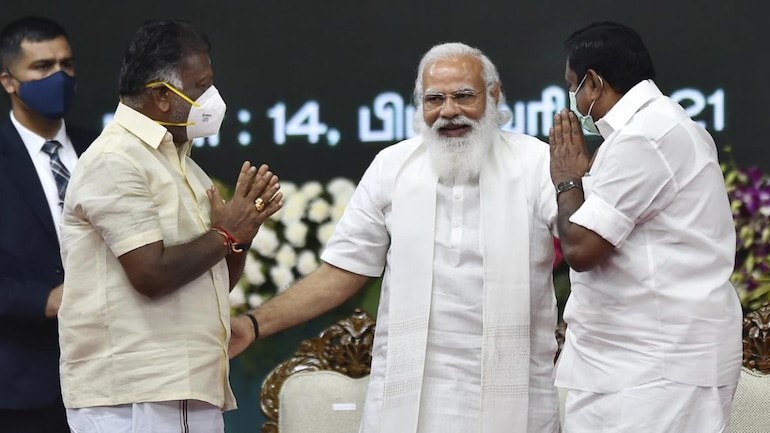
Can BJP replace AIADMK?
Apart from all these problems plaguing the party, the AIADMK has to work out an effective plan to handle the Big Brother pressure of the Bharatiya Janata Party.
Post-Jayalalithaa, the BJP has started to harp on the fact that it is going to replace the AIADMK as a counterforce to the DMK. Many think that BJP may devour AIADMK and by 2024, it may well become the Opposition party in the state.
“But it is doubtful whether the BJP itself will survive after 2024 because there is anger building up against them in the last few years. Except south India, BJP is able to rule in th northern states unlike the Congress. In 2024, the DMK could play a major role in forming an alliance against the BJP. By that time, the AIADMK could also change alliances and the dynamics of state politics could change as well,” said Ramajayam, said the future looks uncertain.
Starting from ‘people welfare schemes’ which was once derogatorily called as ‘freebies’ to putting the state in a growth chart by establishing industries, both the Dravidian majors worked with a competitive spirit. According to economist J Jeyaranjan, it is this ‘competitive mindset’ between the parties that made Tamil Nadu a developed state, and the much-talked about ‘Dravidian Model’ has emerged. However, it seems hard for the BJP to swallow this fact.
Vairamuthu pointed out that the AIADMK would never be replaced by the BJP. This is because the national party has not been able to imbibe Dravidian sentiments.
“In Tamil Nadu, the Dravidian-Tamil sentiment is strong. The people will not accept any other party which moves away from this sentiment. It is only the DMK and the AIADMK, which have sprawling networks till the booth agents level,” he said. Maybe, if the party that MGR built, manages to cash in on this inherent leverage and build on it, they may continue to thrive and stay relevant in the ever-changing fortunes of Indian politics.e MGR era


